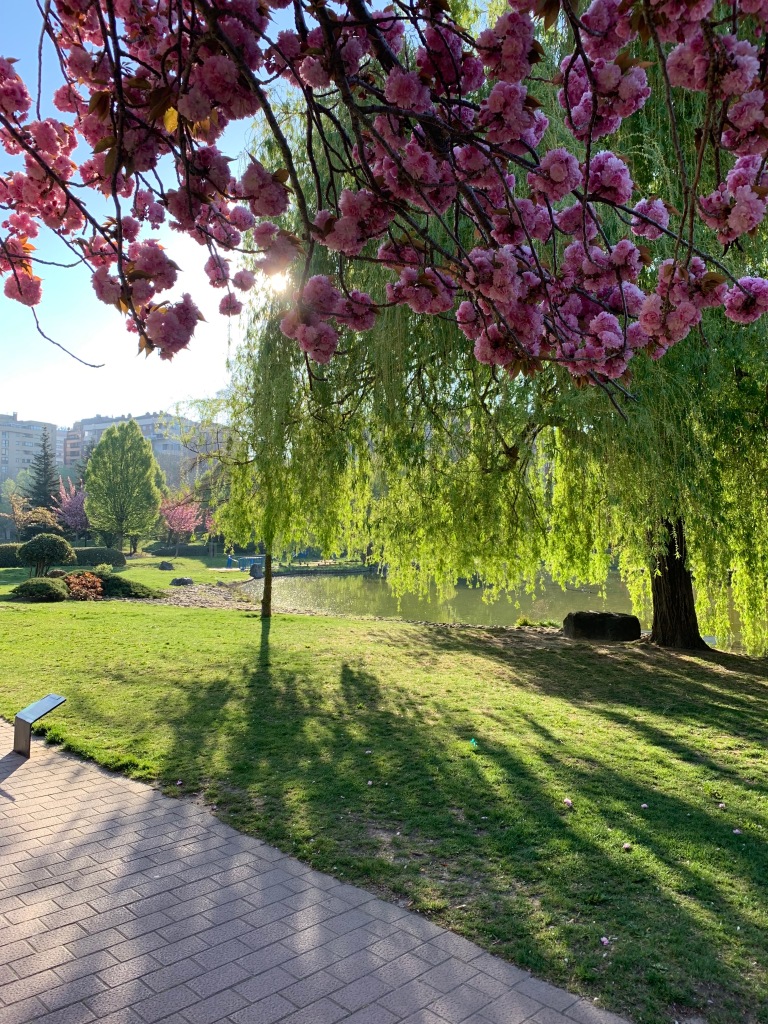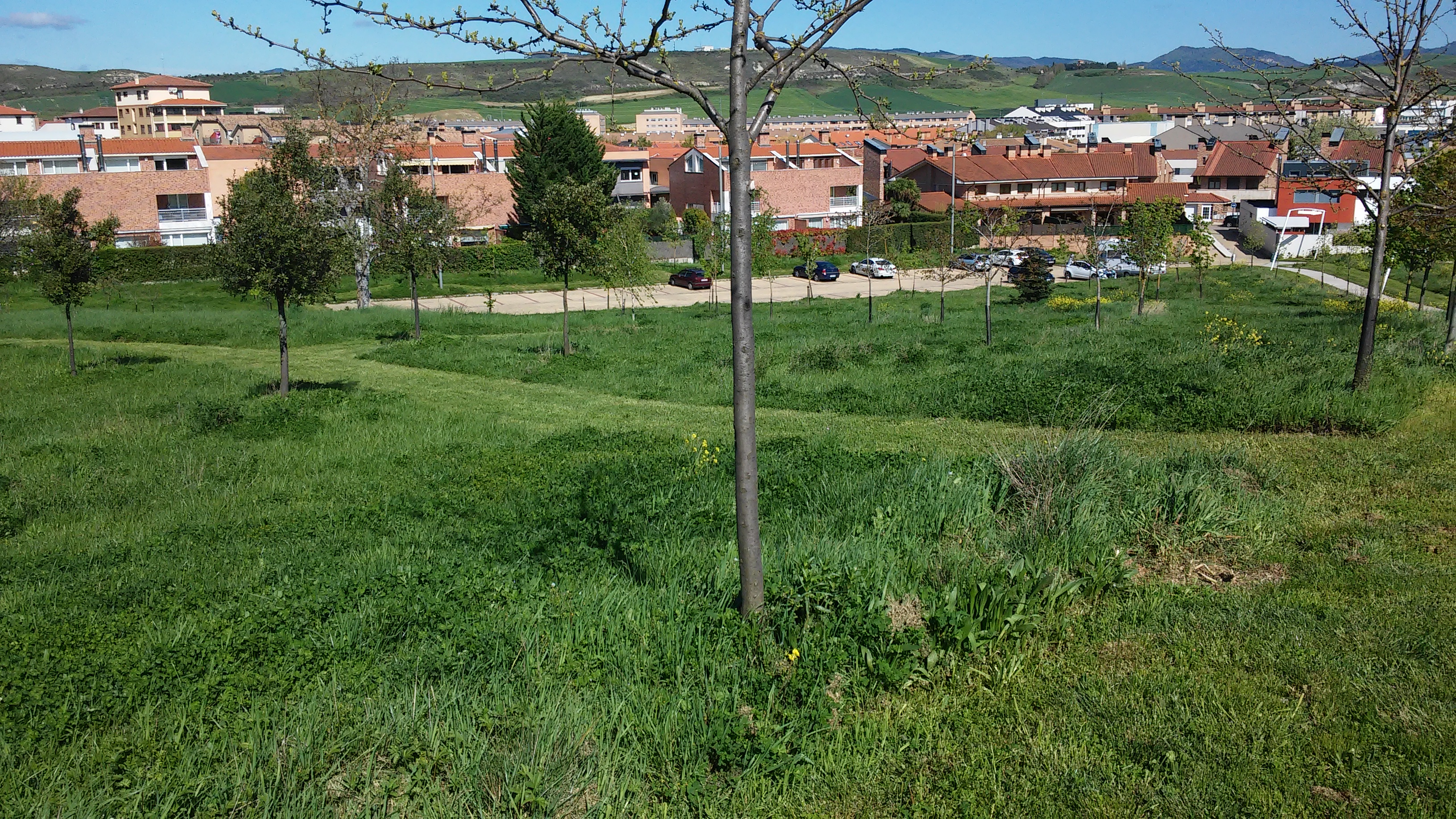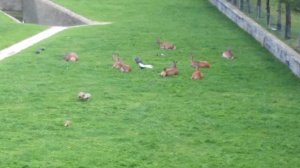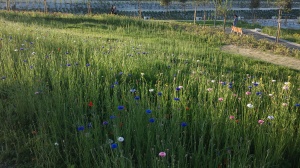Blog Archives
Spring Springing, Sprung

The Great Unfurling
.
Potted hydrangea upon a windowsill
Sets forth fresh leaves: tender, verdant
Sheets break out along dry sticks, fragile.
I daily watch them form as March marches.
.
Granted the gift of infinity of seconds,
In observation, I wish to break out,
Past the patio to spend
Spring beyond, experience
Every plant’s rebirth and blossoming,
To miss not this great unwinding,
.
From forest floor, wild asparagus and
Ferns unfurling, breaking forth
Each bud, young leaves extending,
Spreading, fat fingered
Fronds from chestnut trunks;
.
Witness every sprig of speedwell,
Burst of buttercups,
Spray of daisies, and breeze
Dancing dandelions, dainty dog violets.
.
Later let me see the fall
Of flower petals to the path,
From each high floral bouquet:
Dashing with pink and white
The grass, creating a colourful carpet,
Delicate to delight our way,
.
Through this season; so short, yet
Too intense to appreciate the display.
Been a busy few weeks with little posting – though a fair bit of poetry and some writing, and lots of reading! But mostly just enjoying the spring, which is blooming lovely, if too dry in a lot of places.
I just spent the weekend down in Andalucia, and the heat is rising quickly there, so it’s almost summer, with swifts screaming in the skies already. On the train on the way down, it was clear many fields will give little harvest this year.
Spring is always my most distracted season and this year is no exception. or an exception to the extent that I’ve decided to spend as much time as I can just soaking it up, so I spent hours staring out the train window rather than writing or reading. Nevertheless, the words come, stored up for winter or spluttered out for a short poem.
Hope you like it.

PS, when I returned after the Easter Holidays the hydrangea was nearly dead, having been left unwatered. I gave it some and hope it will recover (it’s not mine, by the way!)
Enjoying Spring?
.
.
The Enjoyment of Spring
February leaves light frost on the park grass,
But the birdsong cutting the chill silence belies
This skin of sparkling crystals; harkens from
Recently breakfasted birds animated to action
As the era of excitement approaches, already
Cold soil broken by budding narcissus prepared to
Perform their demure golden pouts and beside
The warming morning rays upon me shows
The strengthening sun will soon scatter the ice
And afternoon will even induce disrobing, thus
Dallying in sun-drenched dales.
.
Yet, still, I feel
Almost ill at enjoying these delightful days when
We know elsewhere gale forced storm surges
Swamp grasslands with salt, wind whip trunks
Down like twigs, just as most we need them
Growing. The mountain slopes are bare of snow:
Instead several fires on-going, and a bushel
Of other evils await.
Even here, these trees
Are leaving too soon; petals, peeping weakly
Into shape shall feed few bees this spring,
And we fear for their fruits come summer.
.
For the grass beneath the white seems damp,
But even the soil is dry, and blades soon scorched
As we wait for rains, disappeared more than delayed,
During a drought seeming set to last till March.
.

I wrote this poem after a pause in the park on the way to work, the same day I saw this video of the storm surge back in Ireland where they were hit by several named storms while our farmers in Spain were desperate for rain.
Oasis

Oasis
I rested upon some leaves of grass this morning;
Dabbling as the park drakes dipped in the rippling
Pond shimmering sunlight reflections against green:
The distant traffic as irrelevant as desert sand dunes
Beyond the screen, for all the notice the ducks took,
And us, aware of such, see what they mean
By oasis.
Spring has sprung… or has it started?
While Spring officially started at the beginning of the month back home in Ireland, in Spain we are still in the middle of winter, with the next season only set to start in another month on the 21st of March.

the walls of Pamplona dusted with snow
It is, I admit, the height of skiing season, but even here, the daffodils are shooting up and will soon burst buds, the crocuses in the parks are spotting the grass, and I even saw a few daisy and dandelions the other day. The trees are mostly still bare, but showers of catkins have popped out on a few.

my daughter gathering snow for a snowball fight before it melts
Mostly, though, you can just smell it. The air is different. Despite the snow that we had last week, there’s a feeling of spring that even humans living in a city still experience.
Spring is here, as far as I am concerned.
And summer isn’t far behind. For I saw the bats take their first flight of the year and it reminded me of a poem I wrote last year on the subject of signs of summer, more than spring. It’s perhaps a little premature to be thinking about butterflies and bees, but since I haven’t posted a poem in a while, here it is.
Signs of Summer
There are many signs of summer coming, here,
Starting perhaps with cuckoo calls and swallow sighting
And the return of the swifts, or
The first flight of the bats at twilight,
The scent of honeysuckle through open balconies and
The abundance of butterflies on the garden lavender,
Some are specific to Spain, like closing the blinds
Against sunlight to keep the house cool, and
Sleeping with the windows open all night
Pouring water to fill the swimming pool and others
Seen only in this city: setting up the tombola,
Putting the fences around the flowers in the park
In preparation for the festivals and digging up
The road to get it ready for the running of the bulls,
And lastly, putting up with the stench of piss
Upon opening up the street door every morning.
Five Minutes from a Hectic Schedule
Five Minutes in Spring
Five minutes on a park bench
To catch sight of birds other than doves,
A walk along a tree-lined street
Instead of screen-staring upon a bus,
A pause between passing engines to
Actually hear the blackbird,
Lingering by a flowing fountain
To listen to the lovely gurgle,
A long gaze upon a hillside
Growing shades of green for grazing,
A halt, a hesitation, to inhale the
Heady horse chestnut scents;
Five minutes in spring, just five,
To remind us this here is life.

It’s been a busy few weeks here in Pamplona.
I’ve my children’s book, Peter and the Little People out today! You can get it here... https://museituppublishing.com/bookstore/index.php/museitup/fantasy/peter-and-the-little-people-detail
As well as that, I’ve a novella under the name JD Martins, One Night in Boston, out tomorrow! You can get that here… http://www.tirgearrpublishing.com/authors/Martins_JD/one-night-in-boston.htm
What with promoting these and my other books, and preparing a blogtour for One Night in Boston, as well as normal life stuff like end of school year, taking care of the kids and having a baptism, I’ve not had time to do much reading or writing, or getting a chunk of time to get out in the mountains.
But it’s vital to take just a few minutes as spring spins past to appreciate why we’re here, to pause to see just how fast life is flying by. Then get back to the kids and exam correcting, and the edits of the book you swore would be done by Christmas…
The kind of Park I like to see.
Last year, I spotted a park in Pamplona that had a section planted with wild flowers. It was a beautiful sight in late spring and all during summer, and attracted all the passers-by. Including kids who couldn’t resist plucking a few blooms – and good luck to them (if only I could convince a certain 70-year-old to stop plucking the orchids she comes across on her walks in the country – she does it knowing I’ll give out to her if I see the flowers later…).
This year I’ve seen another park, not too far away, in the town of Mutilva, which gave me another emotional lift to see that not every park needs to consist of close-shaved grass.
 They have only mowed the grass along the verge of the paths, and a few extra paths to walk through the grass between the unmown sections, inviting visitors to stroll through the meadow and get close to the wildflowers that are already coming up and blooming – the kids will just go straight into those flowers.
They have only mowed the grass along the verge of the paths, and a few extra paths to walk through the grass between the unmown sections, inviting visitors to stroll through the meadow and get close to the wildflowers that are already coming up and blooming – the kids will just go straight into those flowers.
 It also means the hillside will be greener for longer this summer when the rains stop and it won’t need to be watered – like much of the public gardens here.
It also means the hillside will be greener for longer this summer when the rains stop and it won’t need to be watered – like much of the public gardens here.
 The smell of cut grass is nice, but the scent of wildflowers that blew down the hillside when I just took a walk there was a whole lot better.
The smell of cut grass is nice, but the scent of wildflowers that blew down the hillside when I just took a walk there was a whole lot better.
It’s not the only park in this suburb, and many of the others have only daisies and shorn dandelions today, but it’s nice to see even one exception to the rule of lawns, so good on the town council. I hope their example will be followed.
What, Exactly, Is Rewilding?
I read an interesting article about rewilding today – calling it the “new Pandora’s box in conservation.”
Hardly a title to inspire confidence…
One problem the authors see with rewilding is that the term is fluid and quite ill-defined as yet. It would be better to firm up exactly what rewilding is and is not, and define what it aims to achieve.
I agree, as a scientist, that it would be better to know exactly what we are talking about.
But I think there is room for maneuvering yet.
Rewilding is a new term that has yet to come into its own. It has yet to capture the public consciousness.
And in order to let that happen, I think the term should be as broad as possible for as long as possible.
In fact, perhaps we can have two meanings – just like the word “theory” has two meanings – one in common parlance, and the other in scientific terms. It won’t be that problematic if we have a broad meaning for the wider public discussion and then a more precise, concise or even split terms for use in ecology – for example, the Palaeolithic rewilding, or passive rewilding as mentioned in the article.
I say this because what we don’t want to have happen is that the general public decide that rewilding is some scientific activity which only trained ecologists can pursue, or have a hand in, or a stake in.
Because we will need lots of rewilding, of all types, if we are to get through this century with functioning ecosystems. There are some, such as passive rewilding, which the general public can have a great, and direct, impact on. There are things they can do themselves at home, in addition to supporting more extensive projects and translocations by voting, signing petitions and going to visit places which have had formerly extinct species reintroduced.
An article in the Guardian today, about not mowing the lawn so often so that dandelions can flower and feed the multitude of insect species that rely on them highlights this.

As we live in a world steeped in pesticides, we will need the gardens of our suburbs and cities to give a refuge to the species which would otherwise die out. While research suggests that farmers should plant wildflowers themselves to aid keep pests down in their crops, it’s plain that insects like bees are suffering as we continue to spray.

Luckily, the terrain of the farms I visit near Pamplona makes wildflower verges almost unavoidable, though even here the number of butterflies seems to have plummeted in recent years.
To a certain extent, rewilding is just allowing that little slice of wildness to exist alongside our lives and our lawns, instead of keeping wilderness far from us as we push into that very wilderness.
The man on the street with a garden can help this rewilding, just as the building companies who can’t get financing to build on the lots they bought during the boom can let the weeds grow in the meantime. It might not provide habitat for wolves, or bison, but it can keep bees alive, let butterflies and lizards and small mammals survive.
Instead of even planting grass for lawns, home owners, and councils and building management companies, can plant wildflower meadows instead. I showed an example of one in Pamplona last summer. I look forward to it blooming again this spring.

Wildflower meadow planted in Pamplona park about to bloom in 2015
One type of rewilding that the article didn’t mention, but George Monbiot among others does, is rewilding ourselves – getting back in touch with the nature we have too long either ignored or tried to tie up, impound, mow short and neat. I’ve seen the kids approach this wildflower meadow in a much different way to how they’d approach a lawn. I’m sure you can imagine which they’re more excited by.
We might be disinclined to let our kids dig in the muck these days when everyone’s so obsessed with cleanliness, but allowing them romp through a few flowers will set us smiling more than any pretty new frock or well-maintained playground.


What child can resist making petal angels? And collecting conkers can be done in a clean frock.
And just as we might one day be delighted to have dandelions, we will be grateful for the general public’s work in keeping our lives just a little bit wild.
Park Planting in Pamplona…
This is a new park in Pamplona. I cycle past it everyday. They took down the temporary fence a couple of weeks ago.
When I noticed the poppies growing in the grass, I smiled.
I was glad the company responsible for maintenance was a bit slow to get the lawnmower onto the newly seeded grass.
A few days later, I was glad that the recent rain must be keeping them off the soft sod.
But then I saw other flowers. Beautiful wildflowers I’d never seen before.
And I stopped my bike on the way up this very steep hill.
I stared.
But you know how when your worldview doesn’t include something, it takes a while to see it.
I’d never seen this shit before.
But it was true.
And I took a photo to prove it.
There was no grass…
They’d sown wildflower seeds.
In a new park.
On purpose.
Not lawn. Wildflowers.
My mind is blown.
Rewilding is possible. It’s simple. It’s easier and lower maintenance than keeping wildlife cut back.
And it will be beautiful.








